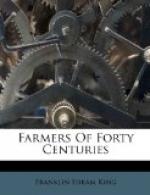The amount of this earth compost prepared and used annually in Shantung is large, as indicated by the cases cited, where more than five thousand pounds, in one instance, and seven thousand pounds in another, were applied per acre for one crop. When two or more crops are grown the same year on the same ground, each is fertilized, hence from three to six or more tons may be applied to each cultivated acre. The methods of preparing compost and of fertilizing in Kiangsu, Chekiang and Kwangtung provinces have been described. In this part of Shantung, in Chihli and north in Manchuria as far as Mukden, the methods are materially different and if possible even more laborious, but clearly rational and effective. Here nearly if not all fertilizer compost is prepared in the villages and carried to the fields, however distant these may be.
Rev. T. J. League very kindly accompanied us to Chengyang on the railway, from which we walked some two miles, back to a prosperous rural village to see their methods of preparing this compost fertilizer. It was toward the close of the afternoon before we reached the village, and from all directions husbandmen were returning from the fields, some with hoes, some with plows, some with drills over their shoulders and others leading donkeys or cattle, and similar customs obtain in Japan, as seen in Fig. 134. These were mostly the younger men. When we reached the village streets the older men, all bareheaded, as were those returning from the fields, and usually with their queues tied about the crown, were visiting, enjoying their pipes of tobacco.
Opium is no longer used openly in China, unless it be permitted to some well along in years with the habit confirmed, and the growing of the poppy is prohibited. The penalties for violating the law are heavy and enforcement is said to be rigid and effective. For the first violation a fine is imposed. If convicted of a second violation the fine is heavier with imprisonment added to help the victim acquire self control, and a third conviction may bring the death penalty. The eradication of the opium scourge must prove a great blessing to China. But with the passing of this most formidable evil, for whose infliction upon China England was largely responsible, it is a great misfortune that through the pitiless efforts of the British-American Tobacco Company her people are rapidly becoming addicted to the western tobacco habit, selfish beyond excuse, filthy beyond measure, and unsanitary in its polluting and oxygen-destroying effect upon the air all are compelled to breathe. It has already become a greater and more inexcusable burden upon mankind than opium ever was.




